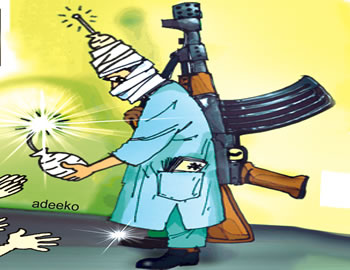Some of the fighters eventually distributed the women including his mother and his two older sisters among themselves as new wives. Anyone who protested was publicly beaten or killed. He could not make sense of it.
ALSO READ: Biafra: IPOB declares Sept 14 as general strike in Igboland
He was consumed with anger and hatred but knew it was only an impotent rage. Gana and the other boys were taken to a different camp where the older ones (14 years and above) were recruited for training as fighters; while the younger ones like himself were given chores of gathering firewood as well as washing the clothes of the fighters. He lived in this new camp for four years until they were rescued by Nigerian Forces.
He is now living in an Internally Displaced Persons (IDP) camp and has no idea what became of his mother or his sisters. He is now withdrawn, hardly speaks but is prone to outbursts of aggression with minimal provocation. Gana is constantly weary and jumps at any loud noise.
Attempts at enrolling him in school have failed as he always beats up all the other children if they as much as looked at him.
The International Organisation for Migration (IOM) estimates that the Boko Haram insurgency has directly or indirectly impacted on the 17.2 million people living in the north-eastern region of Nigeria.
The IOM estimates that at least 3.6 million persons have been directly displaced, with children accounting for about 62 per cent.. In addition to these displaced children, we also have very high numbers of children born to women and girls who were forcefully ‘married’ by the Boko Haram insurgents.
These children are stigmatised, shamed in the community and not accepted even by some of their biological mothers.
Thus, we have a tragedy on our hands, with tens of thousands of displaced children, orphans and children of Boko Haram fighters who have been exposed to massive trauma. For some of these children, psychological distress is ongoing in the form of daily humiliation and stigmatisation – especially for the girls who have returned home as mothers of children, with no clarity as to the identity of the fathers of their children.
In a conservative society like north-eastern Nigeria, this is undoubtedly going to be a source of social exclusion and stigmatisation. So, we now have a generation of young minds who have lost their innocence and childhood; seething with hatred and anger against all and sundry – including self-loathing for acts they witnessed, were coerced to participate in, or that they were simply helpless to prevent.
What fruits would germinate from these minds in the next 10–20 years? The same analogy applies to every part of the country where we have witnessed recurrent civil strife and hotbeds of cyclical killings such as in Plateau, Benue and Southern Kaduna. The north-east is just the case in point, on account of the sheer scale of the insurgency.
In order to avoid the fire next time, we need to seriously invest in social re-engineering with concerted efforts to ensure effective psychosocial rehabilitation.
Coordinated, systematic and planned efforts and investment needs to be embarked upon to help these traumatised youths overcome their identity challenges and seething anger. They need help to move beyond anger towards compassion, understanding and societal re-integration.
Unfortunately, while several non-state actors (non-governmental organisations) have raised funds from all over the world, for psychosocial rehabilitation in the north-east region, only a handful, have actually been effectively engaged in evidence-based and positive activities.
Ongoing efforts are further hampered by those who would rather line their pockets than see budgeted funds go into streams of activities to promote healing and rehabilitation.
It is unconscionable that even within the IDP camps, children and women are still being traumatised and denied of their basic amenities. One would hope that the government at both state and federal levels will identify and make scapegoats of some of these heartless people.
We need to ensure that the funds voted for the reconstruction of the north-east region is judiciously utilised and that the reconstruction effort is not limited to physical rehabilitation alone.
It is gratifying that the government activities now include psychosocial rehabilitation; but social re-engineering with public awareness and sensitisation campaigns are also required. The media, sociologists, psychologists and psychiatrists have an invaluable role to play in this regard.







